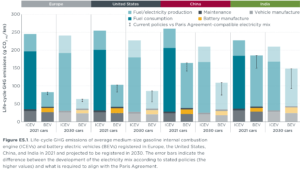While Australia talks up the potential for green steel, Swedish car and steel makers are getting it done with automaker Volvo receiving its first delivery of fossil-free steel this month.
The fossil-free steel, according to steelmaker Ssab, was produced using “hydrogen breakthrough ironmaking technology,” in a partnership with iron ore producer Lkab and energy company Vattenfall.
The delivery of fossil-free steel to Volvo marks a significant milestone both for green steel production and for automotive industry supply chain emissions.
Ssab president and chief executive Martin Lindqvist said, “the first fossil-free steel in the world is not only a breakthrough for Ssab, it represents proof that it’s possible to make the transition and significantly reduce the global carbon footprint of the steel industry.
“We hope that this will inspire others to also want to speed up the green transition,” he said.
Swedish automaker Volvo will be the first car company to use the fossil-free steel in its cars, receiving its first delivery in August. Volvo expects to start manufacturing concept vehicles from the steel in 2022, with mass production to follow.
Volvo president and chief executive Martin Lundstedt said, “we are determined to be a climate-neutral company … this means that our vehicles and machines will be emission-free when in operation but also that we will review the materials, like steel, used in our products and will gradually switch to fossil-free alternatives here as well.”
The fossil-free steel is produced by replacing coking coal with renewable electricity and hydrogen. Ssab aims to move to commercial scale production of the green steel within five years and be completely fossil-free and zero emissions by 2045.
The production of fossil-free steel has global significance given the iron and steel industry represents 7 per cent of energy sector emissions worldwide. The iron and steel industry is the largest industrial consumer of coal for both heat and coke, according to the International Energy Agency.
Green steel has been touted as “an historic opportunity” for Australia by Grattan Institute. Grattan found green steel produced with vast and cheap renewable energy was the country’s largest and most economically viable clean energy opportunity with the potential to create tens of thousands of jobs.
Sweden produces around 4.5 million tonnes of steel, a similar amount to Australia at around 5.5 million tonnes.
Sweden is currently the world-leader in green steel, with Swedish companies having the largest share of investment in low emissions steel according to LeadIT a global collaboration of countries (including Australia) and companies committed to reducing emissions from industry.
Steel is used in engineering and construction and every day products like cars, refrigerators and washing machines.
Cars use an average of 900 kilograms of steel in every vehicle, according to the International Organisation of Motor Vehicle Manufacturers. Steel is used in the car body (panels, doors, boot), the drive train, suspension, wheels, fuel tank and breaking systems.
A car brand known for its high safety standards, Volvo is now calling climate change the “ultimate safety test” for protecting people’s lives inside and outside its vehicles.
This year the car company has made a series of climate announcements including plans for all its vehicles to be “fully electric” by 2030 and carbon neutral by 2040, including emissions cuts across its vehicles, operations and logistics, materials and suppliers.
Volvo is turning its attention to supply chain emissions. According to Volvo, emissions from steel and iron production make up around 20-35 per cent of the material and production emissions for each car.
As well as carbon neutral vehicle manufacturing plants and fossil free steel, Volvo’s aims to increase the share of recycled plastic, aluminium and steel in its cars.
To date, much of the discussion relating to car emissions has focused on comparing emissions from petrol and diesel cars to electricity used by electric vehicles.
Lifecycle emissions from battery electric vehicles are already much lower than conventional vehicles according to analysis by the International Council on Clean Transportation, with reductions growing bigger as electricity grids shift to renewable energy.
As car makers like Volvo shift to electric vehicles, materials and production of cars and batteries will make up a growing share of lifecycle emissions.

Volvo produces around 775,000 cars every year, and recorded a record six month performance in the first half of 2021.








